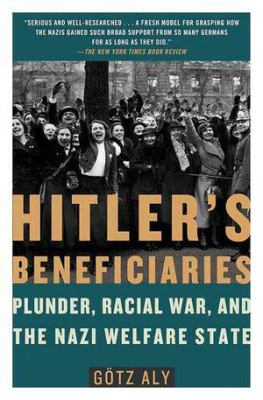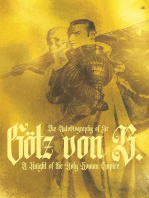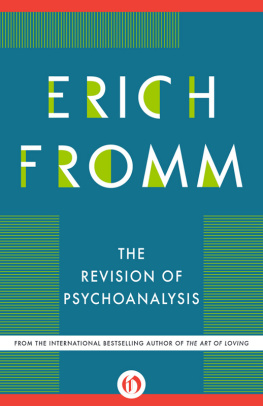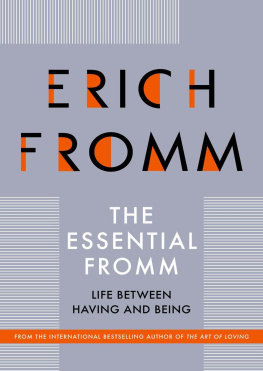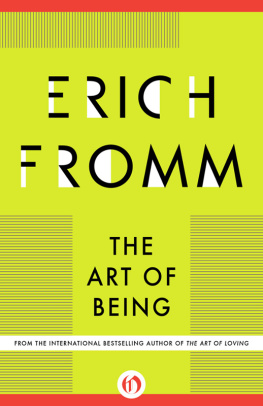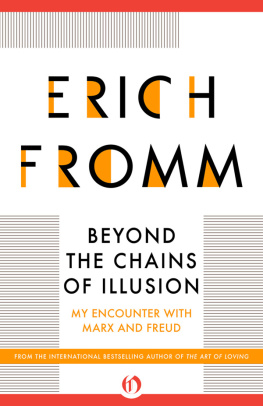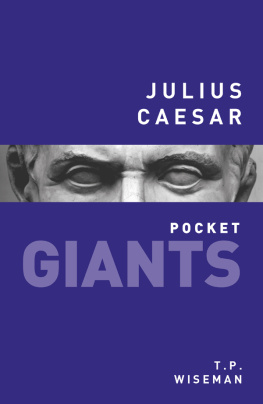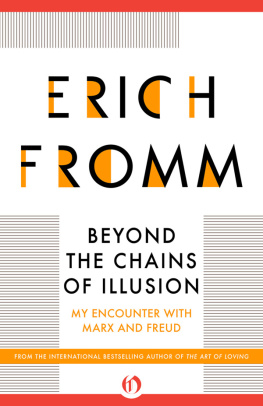Götz Aly - Fromms: How Julius Fromms Condom Empire Fell to the Nazis
Here you can read online Götz Aly - Fromms: How Julius Fromms Condom Empire Fell to the Nazis full text of the book (entire story) in english for free. Download pdf and epub, get meaning, cover and reviews about this ebook. year: 2009, publisher: Other Press, genre: Detective and thriller. Description of the work, (preface) as well as reviews are available. Best literature library LitArk.com created for fans of good reading and offers a wide selection of genres:
Romance novel
Science fiction
Adventure
Detective
Science
History
Home and family
Prose
Art
Politics
Computer
Non-fiction
Religion
Business
Children
Humor
Choose a favorite category and find really read worthwhile books. Enjoy immersion in the world of imagination, feel the emotions of the characters or learn something new for yourself, make an fascinating discovery.

- Book:Fromms: How Julius Fromms Condom Empire Fell to the Nazis
- Author:
- Publisher:Other Press
- Genre:
- Year:2009
- Rating:3 / 5
- Favourites:Add to favourites
- Your mark:
- 60
- 1
- 2
- 3
- 4
- 5
Fromms: How Julius Fromms Condom Empire Fell to the Nazis: summary, description and annotation
We offer to read an annotation, description, summary or preface (depends on what the author of the book "Fromms: How Julius Fromms Condom Empire Fell to the Nazis" wrote himself). If you haven't found the necessary information about the book — write in the comments, we will try to find it.
Fromms: How Julius Fromms Condom Empire Fell to the Nazis — read online for free the complete book (whole text) full work
Below is the text of the book, divided by pages. System saving the place of the last page read, allows you to conveniently read the book "Fromms: How Julius Fromms Condom Empire Fell to the Nazis" online for free, without having to search again every time where you left off. Put a bookmark, and you can go to the page where you finished reading at any time.
Font size:
Interval:
Bookmark:
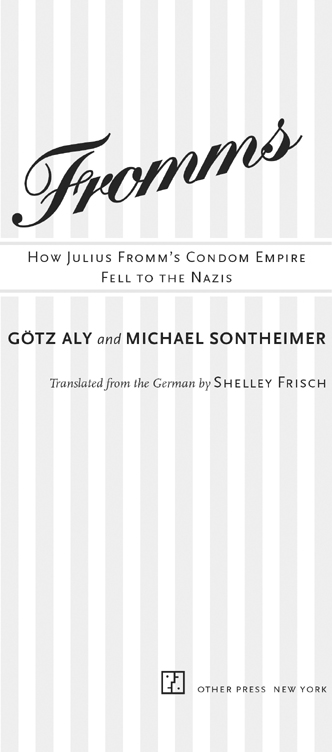
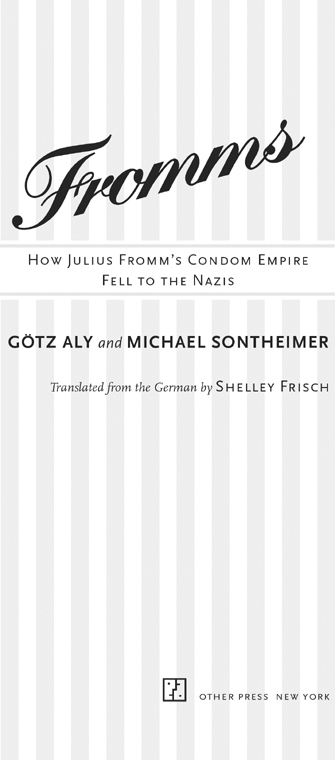

C ONTENTS


T WO P ATHS TO THE S UBJECT OF F ROMMS A CT

GTZ ALY: SEX PLUS JEWS
IN THE FALL OF 2004, two colleagues and I were planning to give a reading of unpublished texts. We chose the Sunday Club in the Prenzlauer Berg section of Berlin as our venue. The Sunday Club had been the first gay club to open in the German Democratic Republic, and was now, according to its Web site, a meeting place for lesbians, gays, and trans-, bi- and heterosexuals.
When it came time to send out announcements, the person in charge of cultural programming asked me whether I really wanted to read the same old run-of-the-mill hetero claptrap. Excuse me? I asked, somewhat taken aback. After all, I had a reputation to uphold. I thought it over for a minute, then remembered that there was a filehidden away in the vault of the German Democratic Republic Central Bank for decadesthat documented the Entjudung (dejudaization, or exclusion of the Jews by the Nazis) at Fromms Act, the condom company in Berlin-Kpenick that had once enjoyed international renown.
I had requested this file several months earlier at the German Federal Archives while investigating another subject. After sifting through it for no more than a few minutes, I realized that it was not pertinent to the topic I was researching, so I returned it to the stacksquite reluctantly, I might add. The intriguing side issues that emerge by happenstance, the ones archivists gloss over when focusing on what they deem to be the major themes in cataloguing their holdings, are what make historiography such a captivating pursuit. Of course, these side issues, with their many enticing twists and turns, make it nearly impossible for researchers to stay on track. There is no escaping this dilemma. Historians who immerse themselves in source material are bound to veer from their self-prescribed paths.
The staff at the Sunday Club was intrigued by the combination of National Socialism, condoms, sex, and Judaism, and we agreed on the topic. But apart from my chance discovery, I was unable to obtain any other expropriation or restitution files pertaining to Julius Fromm, the founder of the company; the archives in Potsdam and Berlin would not release them. Evidently there was still pending litigation. But I did find the address of Edgar Fromm in London, an heir of the late condom manufacturer. I wrote to him requesting permission to examine the files. As it turned out, the addressee had been dead for the past five years.
This is how I launched my research on a topic that until recently I had deemed immaterial and far too specialized. My thanks go to my coreaders at the event, Martin Z. Schrder and Gustav Seibt, and especially to Pedro at the Sunday Club. It was his provocative intervention that sent me on a rewarding byway, a byway that would shed new light on the events of the twentieth century.
It led me to one of the many Jewish businesses that went under during the National Socialist era and are almost universally ignored by historians. It is not hard to figure out why: because these companies were unceremoniously destroyed, they cannot sponsor business historians, who prefer to follow the money. Over the past twenty years, scholarly interest guided by this monetary inequity has produced a peculiar asymmetry, with the perpetrators and profiteers dominating historical inquiry. The companies legal successors have supported research because their professed interest in coming to terms with an unappealing past fosters their image and thus the marketing of their brands; among the many cases in point are Volkswagen, Krupp, Allianz, Daimler-Benz, Deutsche Bank, Degussa, Dresdner Bank, Flick, and Bertelsmann. Because business history functions in this manner, a giant of the twentieth century like Julius Fromm, the creator of the worlds first brand-name condom, seemed destined for oblivion.
Julius Fromm has not even found a place in the lexicon of emigration from German-speaking countries. This book is dedicated to his lifes work, his talent, his creative spirit, and his zest for modernity.
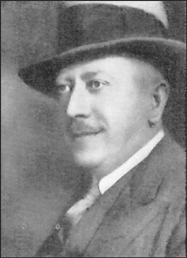
Julius Fromm, mid-1920s
MICHAEL SONTHEIMER: EDDIES MISSION
S OMETIME EARLY IN 1996, I happened to watch a talk show that featured a captivating elderly gentleman named Edgar Fromm, who was describing how his father, Julius, had made condoms the most popular form of contraception in Germany in the 1920s.
When I was growing up in West Berlin in the 1960s, I learned most of what I knew about the facts of life on the streets. I knew what a Fromms was, of coursethat was what you called condoms back then. The plural form was Frommse (or, as some people said, Frommser or Frmmser). Just as Kleenex has come to be synonymous with tissues, the brand name Fromms stood for condoms. What I didnt know then was that the term had originated with a man named Julius Fromm, a German Jew who had to flee Berlin in 1938 and emigrate to England.
One of the perks of professional journalism is getting paid to follow leads of your own choosing. I pitched the topic of the history of the Berlin condom manufacturer for a special issue of Der Spiegel magazine we were putting together on the theme of love. The next thing I knew, I was sitting in the living room of a small house in London, in upscale Hampstead Garden Suburb in North West London, where many Jews who had fled Germany and Austria in the 1930s had settled. It was here that Edgar Fromm was living with his partner, Lisa Abramson. She had emigrated to London from Danzig in 1937. Both were widowed, and were happily devoted to each other.
Over a good whiskey, Edgar Fromm recounted what he knew about his father and the Fromms Act company. He spoke in an elegant German that sounded somewhat old-fashioned. He regarded my article about his father, Julius, to whom he owed so much, as a belated means of setting the record straight. He told me, in English, what he hoped to achieve: To put him back on the map. More documents turned up in archives than could be accommodated in a magazine piece, and so a plan to write a book about the history of Fromms Act began to evolve.
It is quite unusual for journalists to strike up a friendship with their sources, but I continued to visit Eddie and Lisa in London at least once a year, and we got together whenever they came to Berlin. Here, in Edgars hometown, we sought and found the grave of his grandparents and of a cousin at the Jewish cemetery in Weissensee.
When Edgar Fromm died unexpectedly in Baden-Baden in the summer of 1999, I had a guilty conscience. Now he would no longer be able to experience public recognition of his fathers achievements, and my motivation to work on the book was gone. The files gathered dust in a corner.
Font size:
Interval:
Bookmark:
Similar books «Fromms: How Julius Fromms Condom Empire Fell to the Nazis»
Look at similar books to Fromms: How Julius Fromms Condom Empire Fell to the Nazis. We have selected literature similar in name and meaning in the hope of providing readers with more options to find new, interesting, not yet read works.
Discussion, reviews of the book Fromms: How Julius Fromms Condom Empire Fell to the Nazis and just readers' own opinions. Leave your comments, write what you think about the work, its meaning or the main characters. Specify what exactly you liked and what you didn't like, and why you think so.

